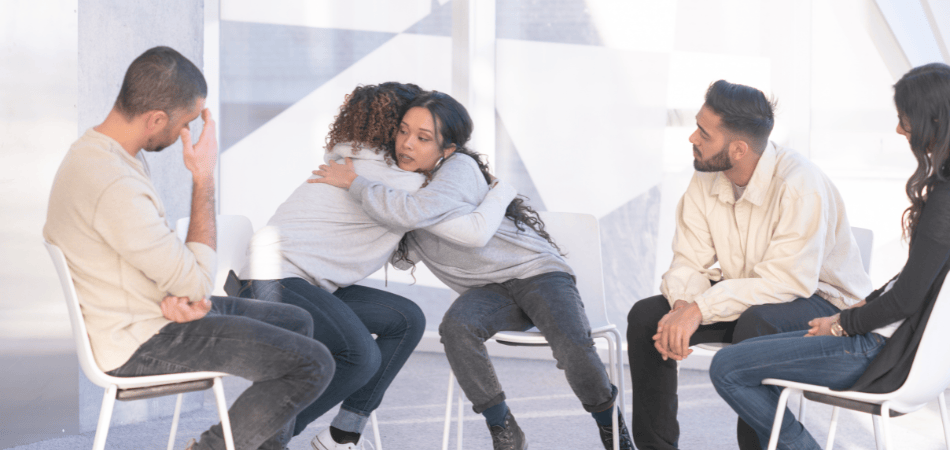Group therapy
“I now realise that any meeting is in some way like a group therapy session. You are understood and accepted straight away. It is a revelation because you’ve spent such a long time thinking nobody understands you.” says Richard, a previous client who has kindly shared his positive group therapy experience. “The first session was frightening but listening to others made me understand I needed to be in rehab and I was in the right place.”
Knowing you are not alone and being able to form a strong connection with the others around you is what makes group therapy so powerful in overcoming a force as strong as addiction. Liberty House believes that group therapy has the potential to change lives, and this is why this treatment modality is used extensively in our programme.
Group therapy for addiction
As the grips of addiction take over, it may push your loved ones away and leave friends on the brink of despair. Many find themselves feeling incredibly isolated and alone during this time, often withdrawing further from society and almost giving up completely. The curtains are shut, the phone goes unanswered and the only time you venture out is to buy your next drink, drug or to engage in compulsive behaviour. It is common to feel all alone in the very small and crippling world of addiction.
These feelings of loneliness and isolation only work to strengthen addiction’s grasp over you, enabling it to seep into every corner of your life. While many find group therapy daunting at first, the reality is that this environment is very loving and supportive. You will feel an immediate sense of relief as you soon find others who share the same thoughts and experiences. On that footing, an instant common ground and unspoken bond is formed between peers.
Group therapy is a vital cornerstone in addiction recovery that brings you back to life after a long time spent feeling that no one understands.
What to expect in group therapy
Group therapy sessions are a central component of our addiction rehab programme as they provide a space for participants to share their experiences and learn from those of others. Generally, group therapy sessions are conducted in an informal conversational style, with all members sitting in a circle or semicircle so that they can see each other easily.
During a typical group therapy session, you can expect to engage with a variety of people at different stages of their addiction recovery. You will often find yourself working alongside individuals who have relapsed, those who are just starting on their journey and experienced group therapy participants, giving you multiple perspectives to draw upon in your own journey. Group therapy will be led by a therapist, who will facilitate discussions and provide guidance throughout the process.
Group therapy allows for flexibility for a number of addiction therapies, such as the 12-step programme, dialectical behaviour therapy (DBT), psychodynamic therapy, sound therapy, art therapy, and mindfulness-based therapies.
The benefits of group therapy in addiction recovery
Group therapy is an important part of rehab treatment, providing you with an opportunity to share your struggles surrounding addiction and work through challenges together. This type of therapy helps you to feel supported by others who have undergone similar experiences, allowing you to connect with one another on a deep level.
Some of the benefits of group therapy include:
- Effectively breaks down barriers and assists in forming a positive bond with your peers
- Affirms a sense of trust and unity within the group
- Challenges negative and untrue beliefs and thoughts
- Provides inspiration for your own addiction recovery as you witness those further ahead in treatment change and grow
- Affirms that communicating with others is a very positive thing in addiction recovery
- Improves compassion and empathy and discourages resentment
- Allows you to provide help and support to others
- Provides an opportunity to resonate with and learn from others’ experiences
- Improves self-worth as your input is valued by your peers
- Helps break the pattern of isolation and bottling up thoughts and feelings
- Fosters the belief that being vulnerable in front of others in your emotions is not a bad thing and you will not be judged for it
- Promotes accountability and responsibility among participants, as it encourages you to take an active role in your own recovery
Overall, the benefits of group therapy are innumerable, making it an essential tool in addiction recovery. It allows you to harness the power of connection and support in your journey towards recovery.
Will group therapy work for me?
Just as every person is unique, so is every recovery journey. It is true that most of our clients benefit enormously from group therapy, however, some may prefer other techniques or find one-to-one sessions more suited to them.
In order to fully reap the benefits of group therapy, you must be committed and willing to participate in the group. This means that it is important to set clear goals at the beginning of each session and make an effort to share your thoughts and feelings openly with other participants. You must also be mindful of your peers, taking care not to overstep boundaries or infringe on others’ privacy.
By approaching group therapy with an open mind and heart, it is much more likely that you will build a strong foundation for lasting addiction recovery.
Disclaimer:
The availability of therapies may vary across UKAT centres. The specific therapies provided will be determined based on your treatment plan and the programme offered at your chosen facility. All treatments are subject to clinical assessment and programme availability at the time of admission. For further details on the therapies included in your treatment plan, please contact our admissions team.





